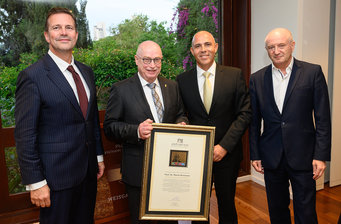Max Planck Society and Weizmann Institute of Science sign contract for a joint excellence program for postdoctoral researchers
During a ceremony at the Weizmann Institute of Science in Rehovot, Israel, on May 15, Max Planck President Martin Stratmann and Alon Chen, President of the Weizmann Institute, signed a cooperation agreement with the aim of deepening scientific cooperation and exchange between the two institutions which both enjoy a global reputation for their research accomplishments Their shared objective is to support exceptional young researchers and retain them for their own cutting-edge research. President Chen stated: "As someone who headed a joint research lab of the Weizmann Institute and the Max Planck Institute of Psychiatry in Munich, I can personally attest that our unique institutions form through collaboration. With the launch of our new joint postdoctoral program, we will extend this exceptional scientific opportunity to outstanding researchers who are at the early stages of their professional careers."

Max Planck President Martin Stratmann and Alon Chen, President of the Weizmann Institute, sign the cooperation agreement.
© Weizmann Institute of Science
The driving forces behind this project are three key individuals: Klaus Blaum, Vice-President of the Chemistry, Physics, and Technology Section at the Max Planck Society (MPG); Professor Roee Ozeri, Vice-President for Development and Communication at the Weizmann Institute of Science (WIS); and Professor Gilad Perez, Dean of the Feinberg Graduate School (FGS) at WIS, who conceived the idea. Blaum shared the story during his laudation, stating, "A year and a half ago, Roee sent me a simple email. It said, 'We have an idea that we would like to discuss with you.' Today, this concept of a collaborative postdoctoral program has become a reality. I am convinced that the young participants in this programme will acquire transformative experiences. They will develop skills and create memories that will last a lifetime, thereby enriching us all."
The programme will accept a maximum of ten postdoctoral researchers annually. Candidates from the fields of physics, chemistry, geosciences, mathematics, and computer science can apply. Following a successful pilot phase, the programme will be expanded to include neuroscience. The funding for the program will span four years, with each postdoctoral researcher spending two years at both the Weizmann Institute and the respective MPI. The programme is financed equally by the Weizmann Institute and the MPG. The first application phase begins in July.
Alon Chen presents President Stratmann with the Weizmann Award in the Sciences and Humanities

From left: Steffen Seibert, Ambassador of the Federal Republic of Germany to Israel, MPG President Martin Stratmann, Alon Chen, President of the Weizmann Institute of Science and Professor Daniel Zajfman, former President of the WIS and now Chair of the Academic Board of the Israel Science Foundation.
© Weizmann Institute of Science
But there was another reason to celebrate: President Martin Stratmann was awarded the 'Weizmann Award in the Sciences and Humanities' in recognition of his dedication to German-Israeli collaboration and the strong connections fostered between the Max Planck Society (MPG), the Minerva Foundation, and research institutions in Israel. "I am deeply honoured for being regarded as a link in the continuous efforts to strengthen the ties between German and Israeli scientists," Stratmann said, expressing his gratitude. "Today's award ceremony represents a small part of the much longer journey we have embarked upon. The MPG and I view the Weizmann Prize as a commitment for the future. We have a strong bond with the Weizmann Institute and Israeli science as a whole, and we will always proudly stand by your side." Notably, two previous presidents of the MPG, Heinz A. Staab (1989) and Reimer Lüst (1995), have also been honoured with this award.
Thanks to its pioneering role in collaboration with Israeli partners, its scientific excellence, and the funding opportunities provided by the Minerva Foundation, the Max Planck Society has become the primary choice in Israel for research cooperation with Germany. With the decision to establish a joint Max Planck-Weizmann Postdoc Programme, another instrument has been established to build on this success story.
Close relations between the institutes
The postdoctoral programme is just one facet of this long and close relationship between the two institutes. President Alon Chen of the Weizmann Institute of Science (WIS) is familiar with the Max Planck Society (MPG) from his previous role as a director at the Max Planck Institute of Psychiatry. In 2019, he succeeded Daniel Zajfman as the president of WIS, who himself had previously served as a director at the Max Planck Institute for Nuclear Physics. It is expected that Alon Chen will be appointed to the Senate of the Max Planck Society during the Annual General Meeting in June. In recognition of his contributions to the MPG and the Minerva Foundation, President Martin Stratmann will present Daniel Zajfman with the Harnack Medal following the Senate meeting in Göttingen in June.
Another milestone in German-Israeli cooperation is still to come this year: the 50th anniversary of the Max Planck Society's Minerva Fellowship Program for doctoral students and postdocs. Ulman Lindenberger, Vice President of the Max Planck Society responsible for Israel and the Minerva Foundation, expresses his satisfaction, stating, "Over the past 15 years, the number of applications for the fellowship programme has increased by nearly 70 percent." And the participants are not only benefiting academically. "Young Israelis seem to appreciate the perhaps less hectic everyday life in Germany," says President Stratmann. "While German scientists are enthusiastic about the flat hierarchies they encounter in Israel."
Reason enough to celebrate this in Jerusalem on 28 November with the Presidents of Israel and Germany, Mr Herzog and Mr Steinmeier.






